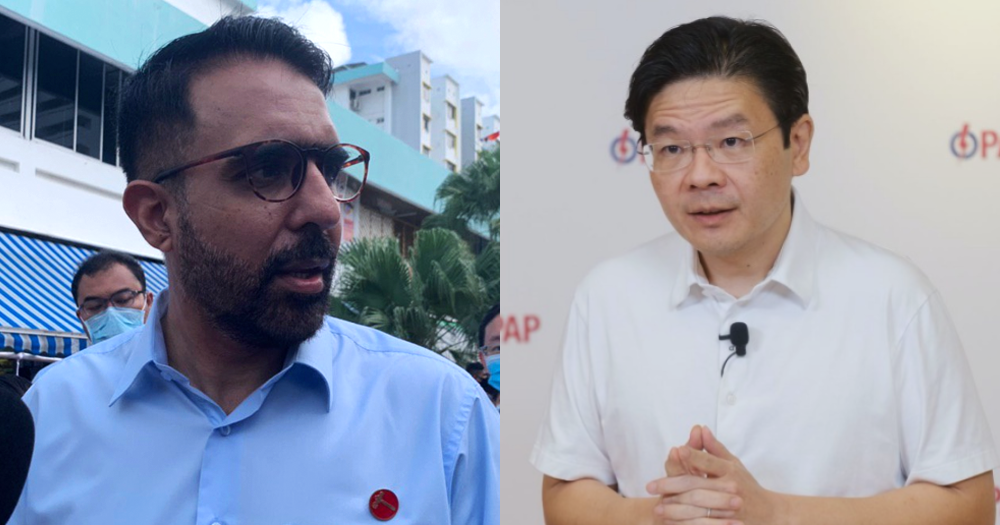Leader of the Opposition Pritam Singh has responded to comments that the Workers' Party (WP) cannot keep asking the government questions.
The comments were made by Minister for National Development Lawrence Wong, at a meeting with People's Action Party (PAP) activists on July 18.
Wong also said at the meeting that WP has a duty to put forward "serious policy alternatives to be scrutinised and debated".
In response to Wong's comments, Pritam posted a statement on the matter on Facebook on July 20.
The statement had earlier appeared almost in full in The Straits Times on July 19.
Questioning government remains opposition's "fundamental role"
Pritam said that it would remain "a fundamental role of a responsible opposition" in a parliamentary democracy to question the government of the day, adding that this was a duty that is "critical in holding the government to account".
He said that this would remain fundamental to the WP's work in Parliament, and outlined the main concerns that the party would focus on in the upcoming term.
These concerns include jobs for Singaporeans, healthcare for seniors, and more generally, cost of living concerns, amongst others, Pritam said.
He added that the WP also planned to "cover political issues that have a direct impact on transparency, accountability, balance and fairness".
Government has civil service as resource
In response to Wong's suggestion that the WP is expected to propose "serious policy alternatives", Pritam highlighted the fact that "the WP continues to be primarily reliant on its volunteer base for its political work" even while the government has access to the "potential resource" of "a 120,000-strong civil service".
In light of this, Pritam said that it "remains to be seen" whether the PAP government would show "greater openness" in their approach, explaining that whether "realistic policy alternatives" can be advanced would depend on the PAP as well.
WP will advance suggestions in spite of constraints
In spite of this, Pritam added, the WP would "continue to advance forward-looking suggestions for the welfare of Singaporeans".
He highlighted Redundancy Insurance and alternative approaches to POFMA as examples of such suggestions, which the WP had raised in the previous session of Parliament.
WP will encourage public conversations
Pritam also said that the WP would "encourage public conversations" on issues such as HDB lease decay, and would release public working papers to highlight such issues.
You can read his statement in full here:
I refer to comments made by Mr Lawrence Wong at a PAP press conference on 18 Jul 2020.
Before GE2020, the Workers' Party (WP) held close to about 7% of the elected seats, represented by 6 MPs. This number has now increased to almost 11% of elected seats, represented by 10 MPs.
The WP remains far from its medium-term aim of securing 1/3 of the elected seats in Parliament, at which point the PAP would be denied a 2/3 majority of seats, preventing it from changing the Constitution - the highest law of our land - at will. To achieve this, the WP needs at least 32 elected MPs in Parliament. Even so, such an outcome would still give the ruling party a very strong mandate with 61 elected seats, allowing it to advance its agenda and policies.
In view of the WP’s GE2020 results - an increase of 4 seats - Mr Wong suggests that it is henceforth not enough for the WP to ask the government questions. Questioning any government of the day however, remains a fundamental role of a responsible opposition - not just in Singapore - but in any parliamentary democracy anywhere in the world. This duty is critical in holding the government to account and it will remain fundamental to the WP's work in Parliament.
Mr Wong argues that the WP is now expected to put forward serious policy alternatives to be scrutinised and debated. While the Government continues to have a 120,000-strong civil service as a potential resource for parliamentary debates, the WP continues to be primarily reliant on its volunteer base for its political work. Despite these constraints, we will continue to advance forward-looking suggestions for the welfare of Singaporeans. This includes proposals such as the Redundancy Insurance and alternative approaches to POFMA, both of which were raised in the previous session of Parliament. In addition, the WP will encourage public conversations - such as the prospects of HDB lease decay - and to that end, will release public working papers to highlight issues that significantly affect Singaporeans.
This term, our efforts in Parliament are centred on key bread-and-butter concerns; jobs for Singaporeans, healthcare for our seniors and more generally, cost of living concerns, amongst others. A key aspect of our focus will cover political issues that have a direct impact on transparency, accountability, balance and fairness.
What remains to be seen is whether the approach of the PAP Government towards greater information sharing will turn in favour of greater openness. The extent to which realistic policy alternatives can be advanced both in public and in Parliament is also a function the PAP's approach to democratic politics. Whatever the expectations the PAP have of the WP, the WP's purpose and approach in Parliament is to advance and achieve better outcomes for Singapore, and to champion the welfare of Singaporeans. We will remain steadfast and fully committed to that cause.
Related stories:
Top image via Syahindah Ishak and PAP
If you like what you read, follow us on Facebook, Instagram, Twitter and Telegram to get the latest updates.
